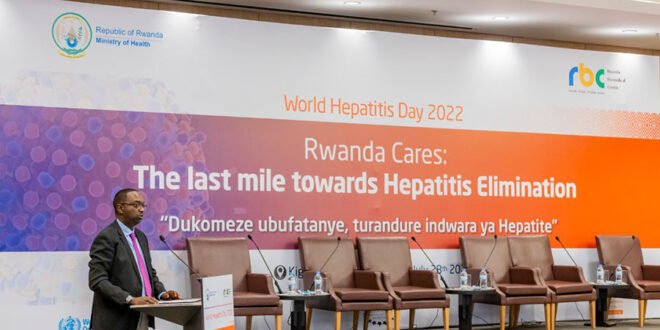Understanding Hepatitis B in Rwanda
Rwanda has made significant strides in addressing the prevalence of Hepatitis B, with the current rate standing at 0.25 percent, according to the latest annual report covering the period from July 2023 to June 2024. This figure indicates that for every 100 individuals who visit health facilities and undergo testing, approximately 0.25 are confirmed to be positive for the virus.
Dr. Charles Berabose, the Director of Sexually Transmitted Infections and Other Blood-Borne Infections at the Rwanda Biomedical Center (RBC), emphasizes that while this number is low, certain vulnerable groups may face higher infection rates. These include individuals with weakened immune systems, such as those living with HIV, cancer patients undergoing chemotherapy, and people with chronic conditions like diabetes. Additionally, pregnant women, individuals in collective settings such as prisons, refugee camps, rehabilitation centers, and key populations—including sex workers, men who have sex with men, and people who inject drugs—are also at increased risk.
The Role of Vaccination in Prevention
One of the key strategies in combating Hepatitis B in Rwanda is the inclusion of the vaccine in the country’s childhood immunization program, which has been in place since 2002. Newborns born to infected mothers receive their first dose of the vaccine within 24 hours of birth, significantly reducing the risk of early transmission.
Catch-up vaccination campaigns are also being conducted for individuals born before 2002, particularly those at high risk or living with infected individuals. Couples where one partner is infected and the other is not are encouraged to undergo screening and vaccination. Dr. Berabose highlights that vaccination and testing services are provided free of charge at all health centers and hospitals, making these essential services accessible to the population.
To date, more than seven million people across the country have been vaccinated, encompassing both childhood and adult immunizations. Healthcare workers are also prioritized for vaccination due to their exposure risks. The government has launched mass testing campaigns in public spaces such as playgrounds and health facilities to raise awareness and encourage more people to get tested.
Screening and Treatment Efforts
The government has screened over five million people for Hepatitis B, with 9,000 currently receiving treatment. Dr. Berabose explains that while the virus is incurable, lifelong treatment can suppress it, reduce its load, and prevent complications. However, Hepatitis B often goes unnoticed because it is largely asymptomatic. When symptoms do appear, they are typically non-specific, such as fatigue, nausea, vomiting, or yellowing of the eyes, which can easily be mistaken for other illnesses like malaria.
This lack of noticeable symptoms makes regular screening crucial for early detection. Many people only seek care when the disease has already caused severe liver damage, often arriving at health facilities with severely swollen abdomens due to fluid buildup—a sign of irreversible liver damage. At this advanced stage, the condition cannot be reversed, and even with treatment, the liver may have developed cirrhosis or progressed to cancer.
Targeted Interventions and Public Awareness
Dr. Berabose urges anyone who has never been tested or vaccinated to visit the nearest health facility. Those who test negative are offered vaccination, emphasizing that early action improves protection. Hepatitis B is primarily transmitted through contact with infected blood or bodily fluids and can also be passed from mother to child during childbirth.
Preventing transmission at birth is a central focus of Rwanda’s efforts to control the disease. All pregnant women are screened twice—once during antenatal care and again at delivery—to detect infections early and ensure exposed newborns receive the birth dose of the vaccine within 24 hours. According to Dr. Berabose, 99 percent of infants exposed to the virus are receiving the birth dose on time, significantly reducing the risk of infection.
The government is also increasing adult vaccination and screening efforts in prisons, detention centers, and rehabilitation centers, aiming to reach as many people as possible, especially those in high-risk groups.
Progress Toward Elimination by 2030
On Rwanda’s progress toward the World Health Organization (WHO) goal of eliminating Hepatitis B by 2030, Dr. Berabose states that the country is on the right path. Current efforts include screening people aged 15 years and above and focusing on mother-to-child transmission as a priority area. Awareness campaigns continue to encourage people to get tested, even if they feel healthy.
Some individuals are surprised when they test positive because they feel well. Dr. Berabose notes that Hepatitis B is often called a silent disease because it doesn’t cause pain. Those on treatment can live normal lives if they take their medication and keep regular follow-ups. However, without early detection, the virus can lead to serious health problems.
 Info Malang Raya Its All About World News
Info Malang Raya Its All About World News




